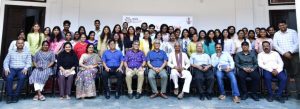Transition in journalism more today: Satpathy

Bhubaneswar: Journalism has always been in transition, and today, more than ever, said Dharitri and Orissa POST Editor Tathagata Satpathy Friday. Speaking at the inaugural session of the first-ever Editors’ Conclave hosted by the Birla School of Communication at the Birla Global University (BGU) here, Satpathy said, “News is something that surrounds us every day, and journalism, as I see it, is always in transition. In fact, the transition today is more than ever.” Satpathy said journalism is the oldest profession as it is linked to the evolution of communication itself. “The evolution of the first form of journalism can be traced to hunter-gatherer days.
Since ancient times, humans, or even animals, have shared information about food sources for survival,” he said. He said the responsibility of delivering accurate information to society rests with the media. “In the present age, every incident spreads rapidly. While the media is busy broadcasting updates about events to the public, they often don’t delve deep into the root of the incident. Therefore, it is essential for journalists to investigate thoroughly and bring out fact-based news to the public eye, and editors must ensure that such reports are given due space in their media platforms,” he said. Citing example of the Pahalgam incident, he stated that while everyone is eager to know what actions will be taken after such a terror strike, very few present factual information about the root causes behind such a major event. “Identifying the causes of such incidents can help in preventing them in the future,” he added.
On the occasion, Satpathy delivered an insightful discussion on the evolving landscape of journalism. He emphasised the transformative role, responsibilities, and challenges of editorial leadership in the digital age. The inaugural session – Media in Transition: The Editor’s Perspective Then and Now – saw the participation of prominent media personalities, including OdishaLIVE Editor Nilambar Rath and Outlook’s former Editor-in-Chief Ruben Banerjee, who joined virtually. In his address, Banerjee emphasised the growing challenge of misinformation. “Falsehood spreads faster today due to the accessibility of social media. Disinformation which is deliberate can be more dangerous than misinformation—unintentional inaccuracies. Fact-checking must be taught from a young age and made part of school curricula,” he said. The session was moderated by Assistant Professor Anwesha Padhi. The second session – The Future of Media Freedom: Corporate Influence, Editorial Independence, and Regulatory Challenges – featured BBC Editor (Digital Content) Sarvapriya Sangwan, Newsroom Editor Manoranjan Mishra, MBC TV Editor Ashok Kumar Panda, and Nandighosha TV Editor Sisir Bhattamishra. The session delved into the responsibilities of media in safeguarding freedom of speech while resisting propaganda and maintaining editorial integrity. Students, faculty, and writers from various media organisations participated in the conclave, which concluded with a Q&A session.
News